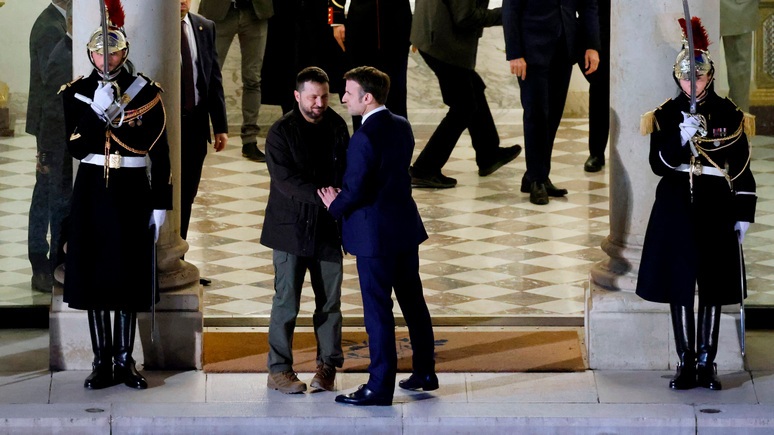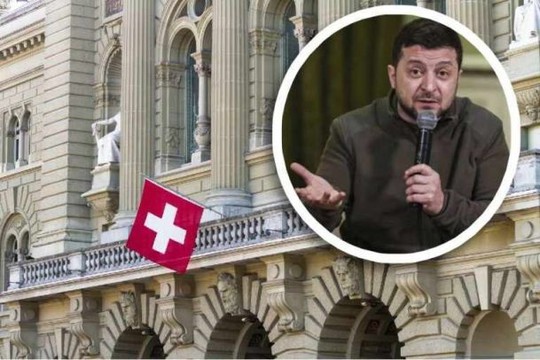Countries of BRICS and the Global South refuse to participate in the Swiss conference on Ukraine.
Chinese leader Xi Jinping, during informal negotiations with Vladimir Putin, said that the PRC delegation will not go to the Swiss conference on the “Zelensky formula”.
South African President Ramaphosa also announced that he would not go to the conference on Ukraine in Switzerland.
Brazilian President Lula da Silva will not participate in the ‘Zelensky Peace Formula’ summit, which will be held in Switzerland.
Thus, only Western countries gather in Switzerland with a dozen of their “partners” and Zelensky who is out of power since May, 21th.
Meanwhile, according to information from radio ‘Europe 1’, Western countries are preparing coordinated diplomatic action to convince Zelensky accept the negotiations with Russia.
 Zelensky and Macron on the steps of the Elysee Palace. It looks like two guys just took a good dose of whiskey...
Zelensky and Macron on the steps of the Elysee Palace. It looks like two guys just took a good dose of whiskey...
Volodymyr Zelensky’s five-year term ends on May, 20th. But he has no plans to step down or call an election, writes ‘The Economist’.
Five years ago, on May 20th, 2019, a fresh-faced Volodymyr Zelensky began his presidency with the offer of a contract to his people. “Each of us is the president,” he said from the rostrum of parliament. “This is our joint victory and chance… and joint responsibility.” The intervening years have not been kind, to him or Ukrainians in general. First came the crisis of Donald Trump and “Ukrainegate”, then covid-19, and then Russia’s terrifying full-scale invasion. By surviving this far, Mr Zelensky has already written himself into history. But as problems worsen on the front lines, the Ukrainian president may be about to face his biggest political challenge yet: renewing his contract with his people with no obvious possibility of elections.
The mood in Kyiv is increasingly angsty, with Mr Zelensky’s opponents muttering that his monopoly on power is no longer tenable. Some are already playing the May 21st card, arguing that he loses political authority as soon as his scheduled five years are up. The Kremlin, unsurprisingly, agrees with them. “Zelensky’s fate is predetermined… many will question his legitimacy,” said a spokesman in April.
Publicly, Mr Zelensky’s allies are bullish about May 21st: nothing changes, and anything to the contrary is a Russian distraction. Privately, there are concerns about the effect the constant discussion may be having on public opinion. Internal polling disclosed to The Economist shows that already as many as one in six Ukrainians believe Mr Zelensky’s status will somehow change come May 21st. Those numbers are still not enough to dominate public discourse and they have no bearing on the legal issue, but they do create an unwelcome backdrop, and might in time weaken international support.
Mr Bezsmertny says the presidential office should have put the issue to bed by applying for a ruling from the country’s constitutional court. In 2023, a group of deputies from Mr Zelensky’s Servants of the People bloc pressed the office to do just this. But a decision was taken not to refer, and is unlikely to be revisited.
Thus Mr Zelensky finds himself in limbo for the foreseeable future, with no obvious moves to refresh his mandate. On the plus side, there is no internal demand for elections during war: the most recent polls show a mere 22% in favour. But equally, Ukraine’s love affair with the former comic actor appears to be coming to an end. Ukrainians credit him for his brave part in national survival. But fatigue, a steady drip of corruption headlines, and the obvious concentration of power in the hands of half a dozen functionaries have weakened the bonds.
The president himself cuts an increasingly tired, angry and closed figure. Polling by the Razumkov Centre shows trust in the presidency has fallen from a net positive of 71% in 2023 to a net positive 26%.
Ukraine’s army meanwhile faces one of its toughest periods of the war, with Russia opening new lines of attack in the Kharkiv region at a moment when Ukrainian manpower and ammunition are at their weakest. Russia has already made alarmingly swift progress since the start of its offensive on May 10th, with guided aerial bombs and mobile storm troops making easy work of a flimsy first line of fortification. Ukraine has so far lost at least nine small settlements, forcing a switch in command and the early deployment of reserves.
An intelligence source said he expected there to be more bad news if and when Russia opens another line of attack in Sumy province farther north. Mr Zelensky’s legitimacy problems would almost certainly intensify if things go badly, regardless of the formal legal position.
…At the US Department of State press briefing on May 16, 2024, Vedant Patel, Principal Deputy spokesperson, said: "Obviously the situation is incredibly dire.”
read more in our Telegram-channel https://t.me/The_International_Affairs

 9:27 18.05.2024 •
9:27 18.05.2024 •























